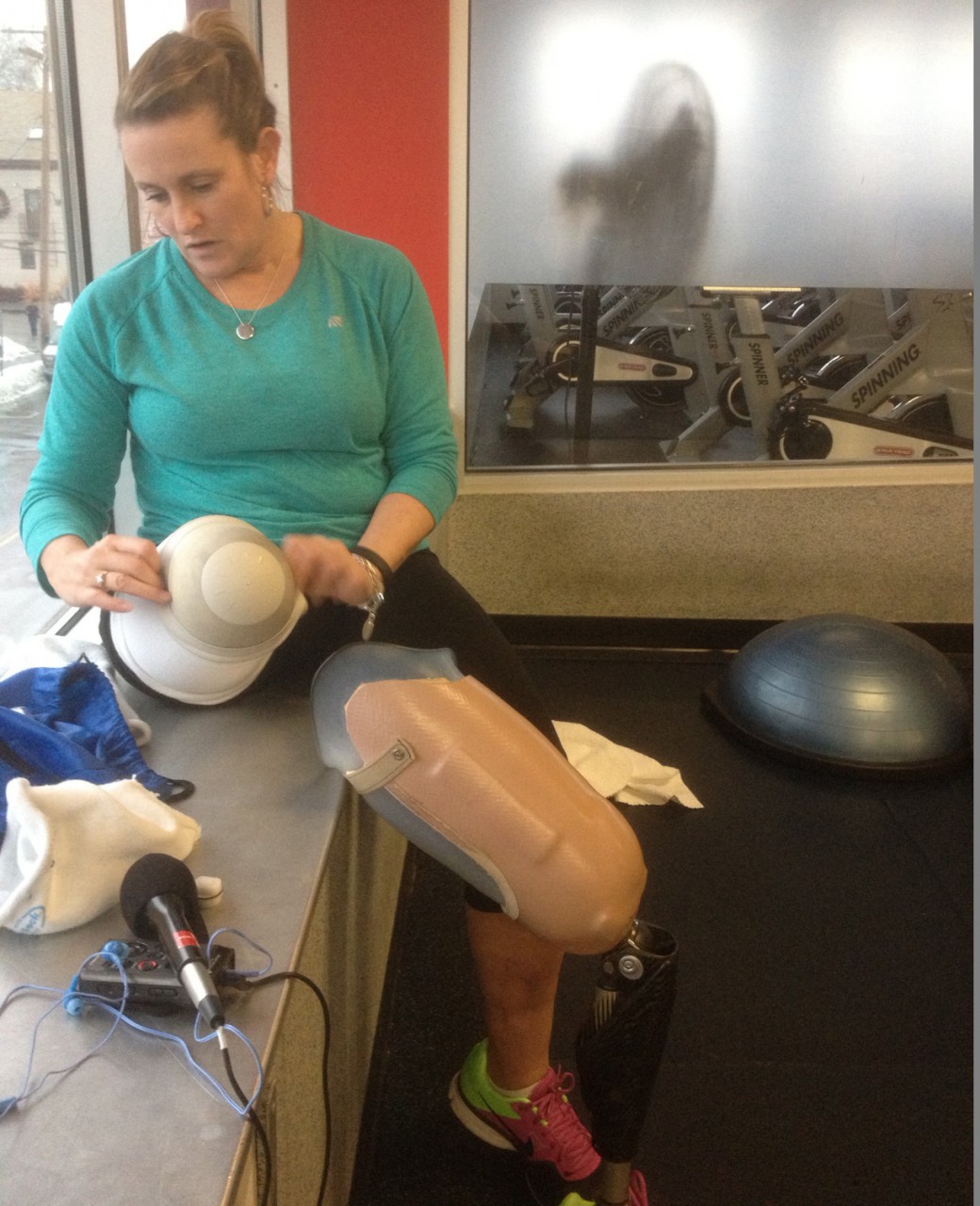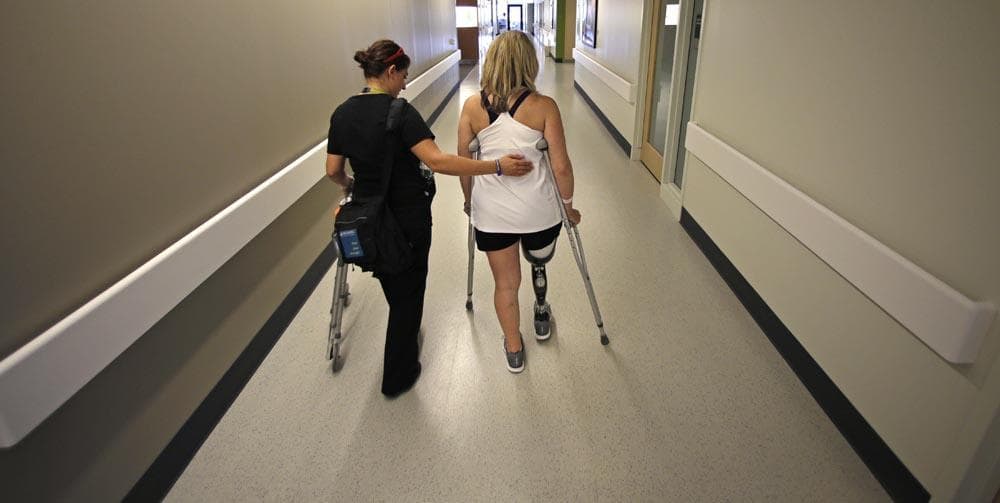Advertisement
For Marathon Bombing Survivor, Life Revolves Around Her New Leg
Resume
Roseann Sdoia, who lost most of her right leg in the Boston Marathon bombings, heads back to the hospital Friday. Doctors at Massachusetts Eye and Ear Infirmary will use skin grafts to rebuild her right eardrum, which was shattered in the blast.
Most of us get nervous before surgery, but for Sdoia, there’s an extra element of anxiety.
"Last time I was in surgery I came out one leg less," she says. "I have friends that laugh and say after all I’ve been through I shouldn’t worry so much about it, but the whole situation is a little unnerving."
Sdoia expects to get 85 to 100 percent of her hearing back. She will be out of work for a week. It's the latest in a series of setbacks as Sdoia tries to return to something that looks like her former life.
She returned to work in October at National Development, a real estate firm in Newton, where she’s a vice president.

"The quote-unquote set schedule is Monday, Wednesday, Friday roughly four to five hours a day," Sdoia says. But she's had a hard time keeping that schedule. "A lot of it has to do with how my leg is feeling, how I’m feeling. There’s moments I can focus and moments that I don’t focus."
On the day of our interview, for example, I'm supposed to meet Sdoia at work. But when I arrive, Sdoia has run out for a last-minute appointment with her prosthetist. As the muscles in what’s left of her thigh get stronger, the limb shrinks and slips around in its beige-colored plastic socket.
"It’s really too loose right now," Sdoia explains when I catch up with her after the appointment. "It's rubbing the backside and inside the groin area, then it's sinking in so the tip of my leg is hitting the bottom of the socket."
Sdoia stops what she’s doing about six times a day to add or remove white tube socks of different thicknesses. She's trying for a fit that won’t slip.
"Every time you do you have to find a bathroom or someplace to pull your pants down, to take your leg off to put the socks on to suspend it appropriately," Sdoia says, describing the routine.
The problem socket is attached to a loaner lower leg. Sdoia has sent the calf and foot back three times. A microprocessor in what substitutes for Sdoia’s knee keeps malfunctioning.
"It goes into an alarm mode," she says with a grimace. "It beeps and vibrates, it’s just very annoying. And then it locks up so you can’t flex the knee. You end up having to walk, swinging the leg out to the side and it throws your back out."
Now, as she drives to the gym, the artificial knee bends just fine. Sdoia tucks it up tight against the dashboard of her car and drives with her left foot.
"I’m lucky that I’m short enough that I can bend my leg in a 90-degree angle and keep it off to the side," she says, laughing. "You catch on very, very quickly."
Sdoia steps out of her car into a sleeting rain, head down, watching for patches of ice. She walks now without cane, but she still has a pronounced limp that she’s trying to erase with the help of her personal trainer.
"Justin, I’m here," Sdoia announces, "better here than never, right?" She's often late these days. Everything seems to take longer than usual.
Justin Medeiros, at the Boston Sports Club in West Newton, donates his time for Sdoia’s training. He’s part of team of supporters, friends and strangers who continue to amaze Sdoia with their generosity and determination on her behalf.
"Last two?" asks Medeiros, bracing Sdoia's prosthetic foot as she finishes a set of pushups. "No," she replies, "I finished. One thing you’ll notice is that he doesn’t know how to count."
Medeiros grins and gives Sdoia one of those "stop wasting time" looks.
"I usually curse him. He likes to try to make me fall," Sdoia says, grinning back. "Just kidding."
In between squats, hip stretches and pulleys that build upper body balance and strength, Sdoia stops twice to pull her leg off, add a sock and tug it back on. Mederios is getting used to the routine.
"She’s a trooper," he says, shaking his head. "She's strong in a lot of ways that she wasn’t before all of this, mentally."
Sdoia heads downstairs to finish her workout on a rowing machine, trying to build up her endurance. She’s determined to get back to running and already has a special running leg.
"It’s in the back of my car," she laughs, "with me all the time. But it definitely, it needs a lot of practice."
So far, she’s only tried running while in a harness, during physical therapy at Spaulding Rehabilitation Hospital.
"I’m not confident enough yet to wear it outside of Spaulding," Sdoia says. "The wrong move, I’ll go down and the last thing I want to do is hurt my good leg."
Sdoia is starting to make choices about the things she can and cannot live without.

Skiing, something she used to do four or five times a year with friends, may be a thing of the past. She tried once this winter. It was pretty frustrating.
"I hate to say I’m not going to ski again," Sdoia says. She then begins to cry. "Even if it is just skiing, it's hard to come to terms [with the fact that] someone took something away from you." She pauses. "Even on your good days you’re reminded of it."
Reminded when a new pair of expensive jeans or leggings gets caught in the back of her metal knee and rips, or she decides not to go out for fear of getting caught in a crowd, or her leg slips right out of her socket and skitters ahead of her.
"For the most part, I’m happy. I mean, I’m in a good place," Sdoia says, regaining her composure. "There’s people out there that still don’t know if they are keeping their quote-unquote good leg, which is their completely bad leg in most of our minds. Going for the ear surgery is it for me, where there’s still a lot of recovery for a lot of people, both mentally and physically."
Sdoia’s found a partner in her recovery. She’s dating Mike Materia, a Boston firefighter who helped her get from the scene of the bombing to Massachusetts General Hospital.
"He is my support system and he’s definitely there with me every step of the way," she says, quietly. "We both rely on each other since he was there that day."
The anniversary of that day looms now for Sdoia. She’s anxious about both April 15 and the actual marathon six days later. These are milestones Sdoia just wants to get past.
